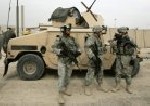 almotamar.net google
almotamar.net google - BAGHDAD, March 26 � The United States ambassador to Iraq, Zalmay Khalilzad, offered a sober assessment of the outlook for the country at his final news conference today.
Although his comments were dressed in the carefully muted language of diplomacy, Mr. Khalilzad�s overall message was that Iraq faced profound troubles and that American patience for helping Iraq deal with those problems was dwindling.
In his opening statement, his most optimistic evaluation was only a little hopeful. �Success,� he said, is �still possible.�
But, he added, �to sustain U.S. support, things have to move at a certain pace.� And, he said, time is running out.
The United States House of Representatives voted last week to call for the withdrawal of American troops by the fall of 2008 and Democratic candidates for president in the next election are promising to drastically reduce the number of American troops in Iraq or to terminate their presence altogether.
Mr. Khalilzad served as ambassador to Iraq for 21 months and oversaw the drafting of the country�s constitution as well as the second nationwide election and a referendum approving the constitution. If, as expected, the United States Senate approves his nomination, Mr. Khalilzad will become ambassador to the United Nations. He will be replaced in Baghdad by Ryan Crocker, a career diplomat, who is currently the ambassador to Pakistan.
While Mr. Khalilzad added that �ultimately Iraq will succeed,� he said that could take a long time. He compared Iraq�s situation to those of Italy, France and Germany as they tried to build their states in preceding centuries. He did not note that it took those countries decades � and in Italy and Germany, some would argue, much of the 19th century, to become integrated nations with working central governments.
He described Iraq as having to survive in a �difficult neighborhood� in which its neighbors did not always have Baghdad�s best interests at heart. Further undermining the country�s prospects and fueling the worsening sectarian strife �is a global terrorist network that�s focused here,� he said.
While Mr. Khalilzad sprinkled his comments with assurances that he was �cautiously optimistic,� he also noted that on each of the important markers of political progress Iraq�s leaders had yet to take crucial steps. Over all, he said, Iraq lacks an agreement among its different religious and ethnic group about what kind of country they want.
That lack of agreement has stymied efforts at reconciliation between those who were loyal to the government of former President Saddam Hussein, who are predominantly Sunni, and the new government, which is predominantly Shiite. It has also hampered the rewriting of the rigid rules used to exclude former members of the Baath party led by Mr. Hussein from government jobs. And it has undercut efforts to rewrite portions of the Iraqi constitution.
The only area on which leaders have made progress is in the approbation of a new law on the ownership of the nation�s oil and the distribution of oil revenues. But even there, the critical implementing legislation has yet to be done, he said.
The greatest risk, according to Mr. Khalilzad comes from the sectarian fighting, which threatens to fracture the society along religious and ethnic lines. �The sectarian violence has been a major negative development, the increase in sectarian violence,� he said.
The area into which he poured the most energy � the involvement of the Sunni Arabs in the political process � has seen modest progress, he said.
Recently, American diplomats and military officials, along with some Iraqis, have reached out to Sunni militants in an effort to woo those elements of the insurgency whom he described as �patriotic� and �reconcilable insurgents� interested in a role in Iraq�s government. Most of these are groups were linked to Mr. Hussein�s former regime rather than to the Sunni religious militants with ties to Al Qaeda.
He said categorically there would be no discussions with individuals linked to Al Qaeda in Mesopotamia.
� There cannot be reconciliation with Al Qaeda,� he said. �They have to be brought to justice. But there are groups that resisted the democratic change, the change in Iraq. It is our goal to get those groups to be reconciled, to accept, to embrace this new Iraq.�
Although the country remains violent, Mr. Khalilzad noted that in the six weeks since the American-backed security plan began, attacks had dropped 25 percent. Baghdad seemed relatively quiet today. There were several improvised explosive devices, several attacks on police and 15 unidentified bodies were found.
In Hilla, south of Baghdad, three Sunni mosques were attacked in retribution for an attack on a Shiite mosque a three days earlier. In Kirkuk, there were several attacks on police and two suicide truck bombs exploded near Ramadi, but initial reports indicated they had killed only the drivers

